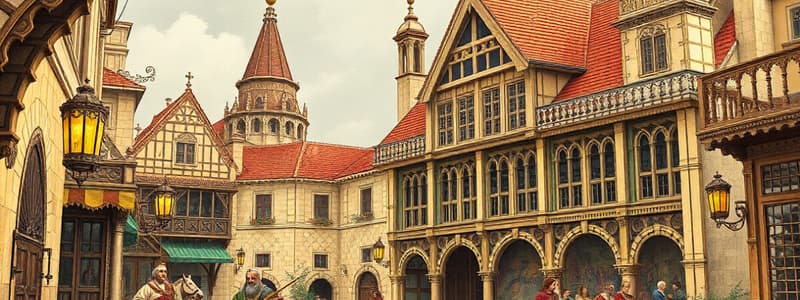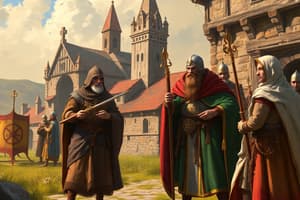Podcast
Questions and Answers
What significant event marked the beginning of the Anglo-Norman Period?
What significant event marked the beginning of the Anglo-Norman Period?
- The signing of the Magna Carta
- The Norman Conquest (correct)
- The establishment of the English Parliament
- The construction of the first stone castle in England
What was the purpose of the Domesday Book created by William the Conqueror in 1086?
What was the purpose of the Domesday Book created by William the Conqueror in 1086?
- To document the royal lineage of England
- To establish laws and regulations
- To create a military strategy for defense
- To record land ownership and management (correct)
Which language became prominent in the royal court and government during the Anglo-Norman Period?
Which language became prominent in the royal court and government during the Anglo-Norman Period?
- German
- Latin
- Old English
- French (correct)
What major change did the Normans bring to the church system in England?
What major change did the Normans bring to the church system in England?
What triggered the Crusades in 1095?
What triggered the Crusades in 1095?
What were Crusaders known for bringing back to Europe after their campaigns?
What were Crusaders known for bringing back to Europe after their campaigns?
What was a primary characteristic of the feudal system introduced by William the Conqueror?
What was a primary characteristic of the feudal system introduced by William the Conqueror?
Which cultural aspects did the Crusaders encounter in the East?
Which cultural aspects did the Crusaders encounter in the East?
During the Anglo-Norman Period, what aspect of the English language changed?
During the Anglo-Norman Period, what aspect of the English language changed?
What role did monasteries play during the Anglo-Norman Period?
What role did monasteries play during the Anglo-Norman Period?
What significant document was signed to address the grievances of the barons against King John?
What significant document was signed to address the grievances of the barons against King John?
How did the establishment of Oxford University contribute to literature?
How did the establishment of Oxford University contribute to literature?
Which type of literature was NOT prevalent during the period discussed?
Which type of literature was NOT prevalent during the period discussed?
What role did the Black Death play in changing the social structure of England?
What role did the Black Death play in changing the social structure of England?
Which renowned work was written in English by Geoffrey Chaucer?
Which renowned work was written in English by Geoffrey Chaucer?
What impact did the arrival of Normans have on the English language?
What impact did the arrival of Normans have on the English language?
What was a notable characteristic of the early universities such as Oxford and Cambridge?
What was a notable characteristic of the early universities such as Oxford and Cambridge?
What was one of the themes that emerged in literature after the signing of the Magna Carta?
What was one of the themes that emerged in literature after the signing of the Magna Carta?
Which major event had a devastating effect on England's population in the 14th century?
Which major event had a devastating effect on England's population in the 14th century?
What term is used to describe the period that began after the Anglo-Norman period, marked by Chaucer’s work?
What term is used to describe the period that began after the Anglo-Norman period, marked by Chaucer’s work?
Flashcards
Anglo-Norman Period
Anglo-Norman Period
The period in English history following the Norman Conquest of 1066, lasting until 1350.
Domesday Book
Domesday Book
William the Conqueror's comprehensive survey of England completed in 1086, recording land ownership, value, and other details.
Feudal System
Feudal System
A hierarchical system of social and political organization where land ownership and loyalty were central.
French
French
Signup and view all the flashcards
Mixing of languages
Mixing of languages
Signup and view all the flashcards
Stone Castles
Stone Castles
Signup and view all the flashcards
Cathedrals
Cathedrals
Signup and view all the flashcards
Monasteries
Monasteries
Signup and view all the flashcards
The Crusades
The Crusades
Signup and view all the flashcards
Jerusalem
Jerusalem
Signup and view all the flashcards
What were the Crusades?
What were the Crusades?
Signup and view all the flashcards
What was the Magna Carta?
What was the Magna Carta?
Signup and view all the flashcards
How was Oxford University established?
How was Oxford University established?
Signup and view all the flashcards
How was Cambridge University established?
How was Cambridge University established?
Signup and view all the flashcards
What was the Black Death?
What was the Black Death?
Signup and view all the flashcards
What was feudalism?
What was feudalism?
Signup and view all the flashcards
How did the Black Death impact feudalism?
How did the Black Death impact feudalism?
Signup and view all the flashcards
What marked the end of the Anglo-Norman period?
What marked the end of the Anglo-Norman period?
Signup and view all the flashcards
Who was Geoffrey Chaucer?
Who was Geoffrey Chaucer?
Signup and view all the flashcards
What was the significance of The Canterbury Tales?
What was the significance of The Canterbury Tales?
Signup and view all the flashcards
Study Notes
Anglo-Norman Period (1066-1350)
- The Norman Conquest in 1066 marked the beginning of this period, with William the Conqueror establishing control.
- Normans built stone castles for control and introduced the feudal system. Land was divided among nobles serving the king.
- Domesday Book (1086): A comprehensive land survey recording ownership, area, and value.
- French became the language of the royal court and government; Latin for churches/schools. English language began changing with integration of French words.
- The church was reorganized with large cathedrals and well-organized monasteries, important centers for writing.
Crusades (1095)
- The Christian Pope ordered military campaigns (Crusades) to retake Jerusalem from Muslims.
- Crusaders encountered Eastern cultures and brought back stories, literature, ideas, spices, and silk.
- New words like "sugar" and "cotton" entered English vocabulary.
- Eastern stories influenced English literature through adventure and quest narratives.
Magna Carta (1215)
- King John signed Magna Carta to avoid civil war, acknowledging the demands of barons.
- Magna Carta was the first step in limiting the power and authority of the royal power.
- It established legal principles for the first time, including the right to a fair process and limits on royal power.
- This principle impacted literature, inspiring works on justice, fairness, and the limitations of power.
Oxford and Cambridge Universities
- Oxford University (c. 1167) emerged as a place of learning for English students after ban from University of Paris.
- Cambridge University (1209) resulted from dissatisfaction about teaching at Oxford.
- Universities were early gatherings of teachers and students in existing structures (churches, buildings).
- Students studied law, medicine, and theology in Latin. Books were handwritten and expensive.
Literature of the Period
- Chronicles written in Latin by monks.
- Romances and stories about King Arthur.
- Chivalry and courtly love expressed in French.
- Religious works and saints' lives were prominent.
- Early Middle English literature, blending French and English influences.
End of the Anglo-Norman Period (1350)
- The Black Death (1348): A devastating plague killing nearly half the population, impacting labor supply and leading to peasant demands for better wages. This weakened the feudal system.
- Language evolved. Upper-class English began replacing French, and people took pride in English.
- Writers started writing in English; Geoffrey Chaucer, with his Canterbury Tales, represented a shift toward common English.
- Decline of the Anglo-Norman period, and introduction to The Age of Chaucer.
Studying That Suits You
Use AI to generate personalized quizzes and flashcards to suit your learning preferences.




